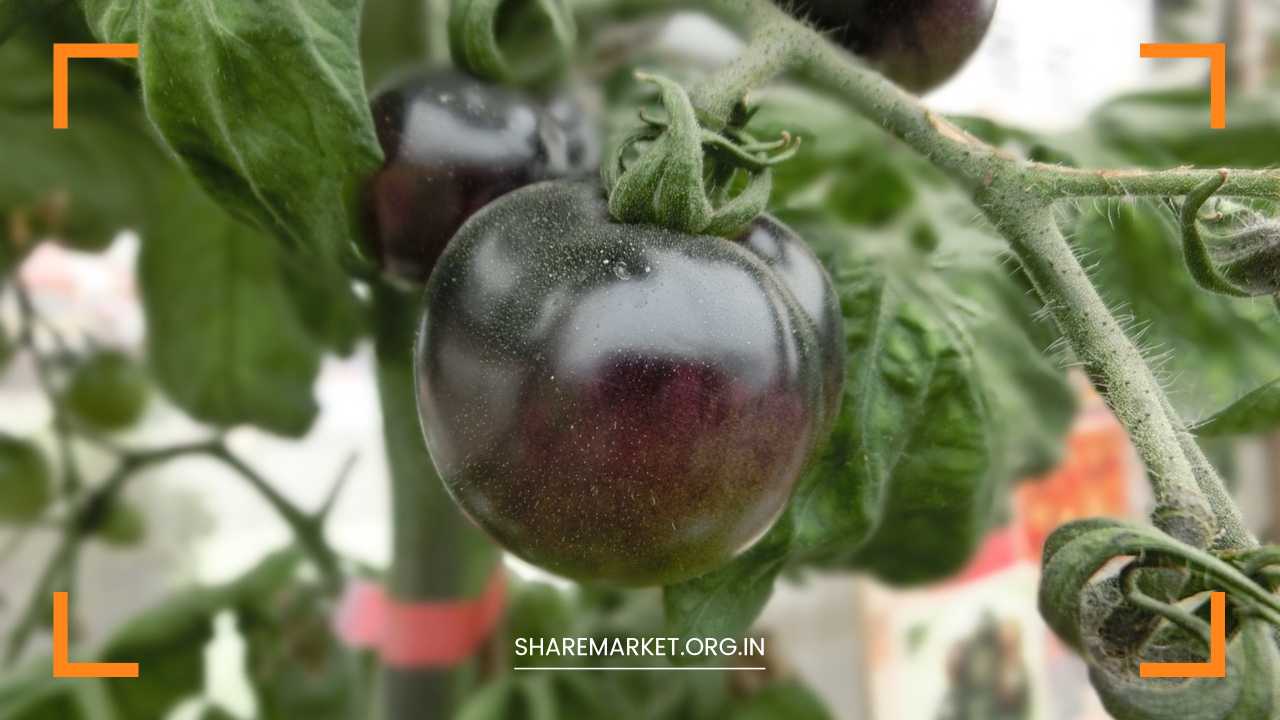Business Idea: Black Tomato Farming

Black Tomato Farming Business
Black Tomato Farming Business
In the realm of agriculture and horticulture, innovation is key to success, and venturing into unique and profitable niches can be a game-changer.
Today, we present a comprehensive exploration of an emerging and potentially highly lucrative agricultural business idea: the cultivation of black tomatoes, also known as Indigo Rose Tomatoes.
Originating in England and developed by Ray Brown through genetic mutation, these dark-hued gems are making waves in the Indian market due to their distinctive qualities and medicinal properties.
This detailed guide will delve into various aspects of black tomato farming, from its historical roots to the intricacies of cultivation, the unique attributes that set it apart, and the potential for substantial earnings in this promising field.
By the end of this article, you will have a comprehensive understanding of the black tomato business and the steps required to embark on this journey.
Historical Roots
The story of black tomatoes, or Indigo Rose Tomatoes, can be traced back to England, where Ray Brown pioneered their cultivation through genetic mutation.
This groundbreaking achievement birthed a unique variety of tomatoes that has since garnered attention worldwide.
The journey from England to India has opened up new possibilities for farmers and entrepreneurs seeking innovative agricultural ventures.
Cultivation Requirements
Before delving into the potential of black tomato farming, it’s crucial to understand the specific requirements for successfully growing this distinct variety.
The climate plays a pivotal role, much like it did in England. India’s climate, with its warm and diverse regions, offers an ideal environment for black tomato cultivation.
- Climate: Black tomatoes thrive in areas with a hot climate, similar to their English origins. Regions with ample sunlight and warmth are considered suitable for their growth. However, they are sensitive to cold temperatures and will not flourish in colder locales.
- Soil Conditions: Proper soil conditions are essential for the cultivation of black tomatoes. The soil should have excellent drainage capabilities to prevent waterlogging, which can harm the plants. Additionally, the pH level of the soil should ideally fall between 6 and 7 for optimal growth.
- Timing: Unlike the more common red tomatoes, black tomatoes have a longer growth cycle. The best time for sowing is during the month of January, aligning with the winter season. By adhering to this timeline, you can anticipate a bountiful harvest of black tomatoes by March-April.
Unique Attributes
What sets black tomatoes apart from their red counterparts are their remarkable attributes, making them a sought-after crop in today’s market.
- Extended Shelf Life: Black tomatoes have a longer shelf life compared to red tomatoes, making them an excellent choice for storage and transportation. This longevity adds value to the crop and reduces wastage.
- Market Value: Due to their distinct color and exceptional quality, black tomatoes command a higher market price than traditional red tomatoes. This premium pricing presents a lucrative opportunity for farmers.
- Medicinal Properties: Beyond their culinary appeal, black tomatoes are celebrated for their potential health benefits. They have been found to aid in weight management, regulate blood sugar levels, and reduce cholesterol. These qualities have earned them a reputation as a “superfood.”
- Flavor Profile: Black tomatoes offer a unique flavor experience. When consumed raw, they strike a delicate balance between sourness and sweetness, with a subtle hint of saltiness. This distinctive taste appeals to discerning palates.
Earning Potential
One of the primary considerations for any business venture is the potential for profitability. Cultivating black tomatoes offers promising financial prospects, with a competitive edge in the market.
- Cost of Cultivation: The cost of cultivating black tomatoes is relatively comparable to that of red tomatoes. The primary investment lies in procuring the black tomato seeds. These seeds are essential to initiate the cultivation process.
- Profit Margins: The profit potential from black tomato cultivation is substantial. With prudent management and adherence to best practices, farmers can expect to earn approximately Rs 4-5 lakh per hectare. The exact earnings can vary based on factors such as yield, market demand, and pricing strategy.
- Value Addition: To further enhance profitability, consider value addition through packaging and branding. Well-packaged black tomatoes can target larger urban markets, commanding premium prices and increasing profit margins.
Market Opportunities
Understanding market dynamics is pivotal to the success of any business venture. Black tomatoes present exciting opportunities in the Indian market.
- Growing Demand: The demand for black tomatoes is on the rise in India. As consumers become more health-conscious and seek unique culinary experiences, these tomatoes are gaining popularity for their exceptional qualities and potential health benefits.
- Health and Wellness Trends: In an era characterized by a focus on health and wellness, black tomatoes align perfectly with the preferences of health-conscious consumers. Their medicinal properties and distinctive flavor make them a valuable addition to a balanced diet.
- Premium Market Segment: Black tomatoes occupy a premium segment in the market due to their unique attributes and limited availability. This exclusivity positions them as an attractive choice for consumers willing to pay a premium for quality.
Challenges and Mitigation Strategies
While the prospects of black tomato farming are promising, it’s essential to be aware of potential challenges and implement strategies to overcome them.
- Climate Sensitivity: Black tomatoes are sensitive to cold temperatures. Farmers must carefully choose their cultivation locations to ensure a suitable climate for optimal growth. Utilizing greenhouses or controlled environments can help mitigate climate-related risks.
- Pest and Disease Management: Like all crops, black tomatoes are susceptible to pests and diseases. Implementing effective pest control measures and practicing good crop management can help protect your yield.
- Market Competition: As the popularity of black tomatoes grows, competition may increase. To stay competitive, consider unique selling propositions (USPs), such as superior quality, organic cultivation methods, or innovative packaging.
Final Thoughts:
Cultivating black tomatoes is not just an agricultural endeavor; it’s an opportunity to tap into a unique and potentially highly profitable market.
These remarkable tomatoes, with their distinctive color, extended shelf life, and medicinal properties, offer a promising business proposition for farmers and entrepreneurs in India.
By adhering to the cultivation requirements, understanding the unique attributes, and exploring the market opportunities, you can position yourself for success in the black tomato business.
With the right strategy, a commitment to quality, and a focus on meeting consumer demands, you can reap the rewards of this innovative agricultural venture.
In conclusion, black tomato farming represents more than just a business idea; it’s a chance to be a part of a growing trend in agriculture and cater to the evolving tastes and preferences of consumers.
As you embark on this journey, remember that success in the world of black tomatoes is not just about cultivation but also about creating a brand and product that resonates with health-conscious and discerning consumers.
The future of farming is evolving, and black tomatoes could be your ticket to a thriving and profitable agricultural enterprise in India.

















